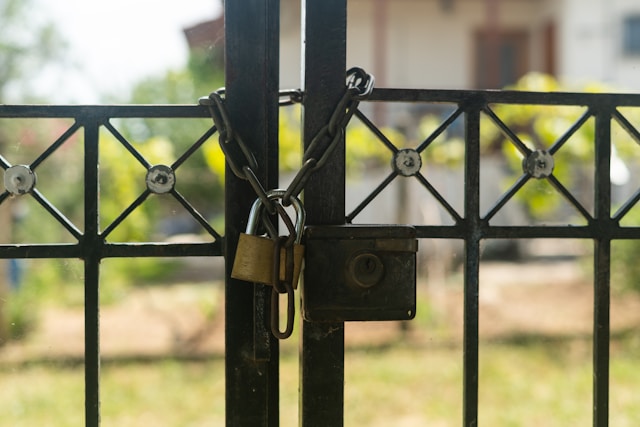Heading out on vacation should bring you peace of mind not anxiety over whether your home is safe while you’re away. Unfortunately, empty homes can become targets for break-ins, accidents, and other unforeseen issues. Learning how to secure your home while on vacation is essential if you want to relax knowing everything back home is protected.
With a little preparation, you can minimize risks and return to your home exactly as you left it. This guide will walk you through the smartest vacation home security tips so you can enjoy your time away stress-free.
Secure All Entry Points
One of the first and most critical steps is to ensure that every potential access point to your home is secure. Most burglars enter through unlocked doors or windows, so locking everything is non-negotiable.
Check and double-check all exterior doors, windows, the garage, and even basement entrances. Install deadbolt locks if you don’t already have them. Sliding glass doors should have extra reinforcements like security bars or foot locks. If you have older windows or doors, consider upgrading the hardware to tamper-proof options or installing window sensors for added peace of mind.
Use Smart Home Devices for Security
Thanks to technology, home safety while traveling has never been easier. Smart home security systems can monitor and alert you about suspicious activity, no matter where you are.
Install outdoor and indoor security cameras, especially around entry points. Video doorbells are a popular choice, allowing you to see and speak to visitors in real time. Motion detectors with floodlights can also deter unwanted activity around your property. If possible, connect your cameras to a mobile app so you can monitor your home from your phone during your vacation.
Smart locks are another useful upgrade, allowing you to lock or unlock doors remotely. You can even grant one-time access codes to trusted neighbors or house sitters without handing over a physical key.
Make It Look Like Someone’s Home
One of the simplest vacation home security tips is to avoid making your absence obvious. Burglars often look for signs that a house is empty such as dark windows, overflowing mailboxes, or no activity for days.
Set timers on lights in various rooms so they turn on and off at different intervals, mimicking normal behavior. Consider using smart plugs to control radios or TVs to create noise and light variation. Keep your curtains or blinds slightly open to give the appearance that someone is inside, but not so wide that valuables are visible from the street.
It’s also a good idea to keep a car in the driveway if possible or ask a neighbor to park theirs there from time to time.
Ask a Friend or Neighbor for Help
Enlisting a friend, family member, or trusted neighbor to keep an eye on your home while you’re away is one of the best ways to prevent burglary while on vacation. Give them a spare ke never leave it under a doormat or flowerpot and ask them to check in occasionally.
They can bring in the mail, take out the trash bins, and inspect for signs of damage or forced entry. Let them know how to reach you in case of emergency, and consider leaving instructions for operating alarm systems or smart devices.
If your neighborhood has a community watch program, alert them of your travel plans so they can give extra attention to your property.
Pause Deliveries and Protect Valuables
An overflowing mailbox or a stack of packages on your porch is a sure giveaway that you’re not home. Contact your local post office to pause mail delivery, or have a neighbor collect your letters and parcels.
Inside your home, make sure valuables such as jewelry, cash, passports, and electronics are secured in a safe or safety deposit box. If you don’t have a safe, at least hide these items in places that aren’t obvious to intruders.
Safeguard Against Utility and Weather Hazards
Home security isn’t just about preventing break-ins—it also includes protecting your house from accidents that could occur while it’s unattended. One common issue is water damage from leaky pipes or malfunctioning appliances. Shut off the water supply to washing machines, dishwashers, and sinks if you’ll be away for more than a few days.
Unplug non-essential electronics to reduce the risk of electrical fires and save on energy. If you’re vacationing during cold months, keep your thermostat set to a safe temperature (typically no lower than 55°F) to prevent pipes from freezing. If it’s summer, consider setting the air conditioning to a moderate temperature to protect furniture and electronics from heat and humidity.
Create a Final Pre-Trip Checklist
Before heading out, walk through your home one last time using a checklist. This ensures you’ve covered all your bases and nothing is left to chance. Include items like:
-
All doors and windows locked
-
Smart devices activated
-
Lights and timers set
-
Mail paused or pickup arranged
-
Security cameras and alarms tested
-
Thermostat adjusted
-
Emergency contacts informed
Taking these steps might take an extra 30 minutes, but the peace of mind is well worth the time investment.
Final Thoughts
Knowing how to secure your home while on vacation helps you travel with confidence and minimizes the chances of returning to an unwelcome surprise. From investing in smart home technology to asking a neighbor to keep watch, even small actions can make a big difference.









